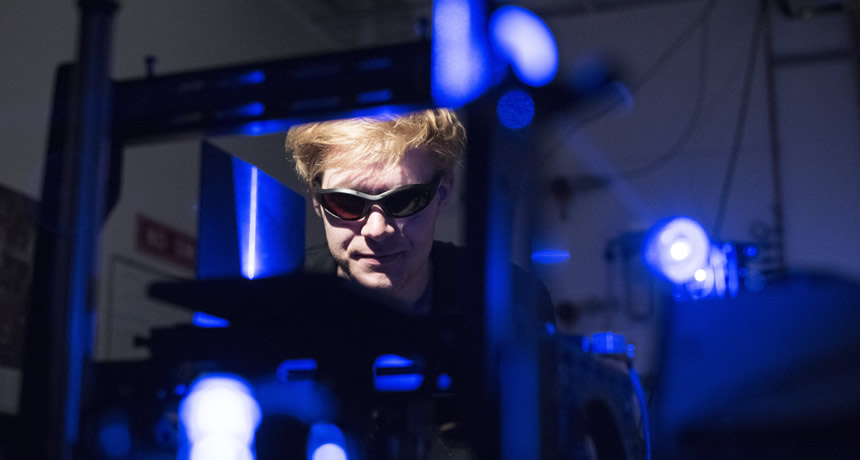Research

The Department of Physics at the University of Alberta supports a broad spectrum of research areas, from astronomic-scale studies of the Universe to theories about infinitesimally small subatomic particles. Our featured research areas are:
- Astrophysics and Gravity
- Biophysics
- Condensed Matter Physics and Atomic, Molecular & Optical Physics
- Geophysics
- Particle Physics
- Space and Plasma Physics
Download Brochure of All Research Areas
Astrophysics & Gravity
The astrophysics faculty explore questions such as:
- How did the universe form?
- How did structures form in the early universe?
- How do clouds of gas form stars and planets?
- What happens when stars collide and merge?
- How do stars explode as supernovae?
- How do black holes accrete gas and create relativistic jets?
- What are neurton stars made out of?
- What happens inside of black holes?
Researchers |
Links |
Download Astrophysics & Gravity Brochure
Biophysics
Biological physics uses the concepts and tools of physics to elucidate the principles and mechanisms underlying living systems, from the behaviour of biological molecules like proteins to the functioning of cells and organisms.
Research in Biophysics at the University of Alberta explores a range of theoretical, computational, and experimental problems, including how protein and RNA structures fold, mechanisms of neurodegeneration and cancer, function and evolution of gene networks, the role of quantum effects in biology, and improved methods discovering new drugs and mitigating drug resistance. These studies take advantage of tools like advanced single-molecule force spectroscopy, flow cytometry, live-cell imaging and microfluidic devices, THz laser sources, and high-performance computing facilities. Group members also collaborate extensively with colleagues in the life sciences and medicine.
Researchers
|
Links |
Condensed Matter Physics and Atomic, Molecular & Optical Physics (CMP | AMOP)
Researchers in Condensed Matter Physics and Atomic, Molecular & Optical Physics at the University of Alberta use advanced computational resources, state-of-the-art experimental facilities in CCIS and the nanoFAB explore a wide range of topics, including: magnetism, photonics, optomechanics, quantum technologies, scanning probe microscopy, strongly correlated electrons, superconductivity, superfluidity, topological phases of matter, ultracold quantum gases, ultrafast laser spectroscopy.
Researchers
Adjuncts |
Links |
Geophysics
The wide variety of research in Geophysics at the University of Alberta includes both fundamental and more applied geophysical science projects. Current research focuses on the field of geophysical data processing, theoretical and applied seismology, earthquake studies, geodynamics, geomagnetism and paleomagnetism, magnetotellurics, environmental geophysics, geothermal energy, climatology and planetary geophysics.
Researchers
|
Links |
Particle Physics
The particle physics group at University of Alberta studies the fundamental nature of matter and force. Our work tries to answer some of the most fundamental questions in nature, such as: what is the nature of dark matter? why is the Universe full of matter and not anti-matter? how do neutrinos change flavour and are they their own anti-particle?
Our group plays major roles in large international collaborations around the globe at CERN (Switzerland), SNOLAB (Ontario) and the South Pole.
Researchers |
Links |
Download Particle Physics Brochure
Space and Plasma Physics
Space Physics involves the study of charged particles and magnetic fields in the invisible realms above and beyond the atmospheres of planets. It includes the study of the Sun’s corona, the ionosphere and magnetosphere of planets, the heliosphere, and the local interstellar medium. The ultimate challenge of space physics is to understand the physical concepts behind space weather and to someday be able to accurately predict it.
Plasma Physics is an important field of study in many research activities at the University of Alberta. Plasmas are central in the physics of magnetic and inertial confinement fusion experiments. Their dynamics are key in many laser processes and applications, including laser wakefield particle acceleration. They are also ubiquitous in our near-space and cosmic environment.
Researchers |
Links
|